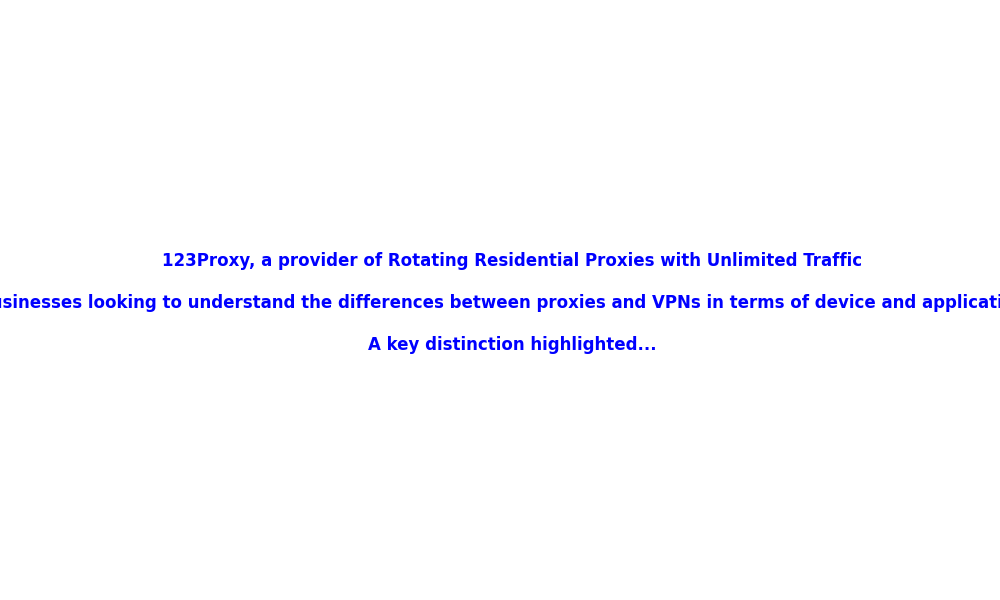Key Takeaways:
- Proxies and VPNs both have their unique use cases for businesses.
- Proxies work at the application level, while VPNs operate at the operating system level.
- VPN provides encryption for all internet traffic, offering enhanced security.
1. Introduction
In today’s digital landscape, businesses are constantly seeking ways to enhance their online security and protect their sensitive data. One common approach is through the use of proxies and VPNs. These tools help mask IP addresses, providing a layer of anonymity and security for businesses operating online.
123Proxy, a leading provider of Rotating Residential Proxies with Unlimited Traffic, offers businesses the opportunity to leverage proxy technology for their specific needs. With a focus on device and application compatibility, it is essential to understand the differences between proxies and VPNs to make an informed decision.
Let’s delve deeper into the world of proxies and VPNs to explore their unique features and benefits for businesses.
2. Understanding Proxy Servers
A proxy server acts as an intermediary between a user’s device and the internet. When a user sends a request to access a website, the request is first processed by the proxy server, which then forwards the request to the target server. This process helps mask the user’s IP address, providing a level of anonymity.
123Proxy’s Unmetered Residential Proxies boast a 50M+ IP pool, offering high-quality real residential IPs from 150+ countries. This wide range of IP addresses ensures that businesses can access geographically restricted content with ease.
With proxies, device and application compatibility is a key advantage. Proxies can work with any device or app that supports proxy server settings, making them versatile for businesses with diverse technological needs.
3. Understanding VPNs
On the other hand, a Virtual Private Network (VPN) encrypts all data transmitted between a user’s device and the internet. This encryption provides an extra layer of security, ensuring that sensitive information remains protected from potential threats.
123Proxy’s VPN service enhances security by encrypting all internet traffic and routing it through secure servers. This level of encryption is ideal for businesses handling confidential data or conducting transactions online.
VPN compatibility extends to all devices and applications that connect to the internet, offering a comprehensive security solution across multiple platforms.
4. Device and Application Compatibility
Proxies, while effective in masking IP addresses, typically work with only one app or browser at a time. This limitation can be cumbersome for businesses requiring simultaneous access to multiple online platforms.
On the other hand, VPNs provide system-wide protection by encrypting all internet traffic. This seamless integration ensures that all data transmitted from the device is secured, regardless of the application used.
Businesses looking for a comprehensive security solution across multiple devices and applications may find VPNs to be a more suitable option.
5. Ease of Integration
One key factor to consider when choosing between proxies and VPNs is ease of integration. Proxies are easy to set up and configure, requiring minimal effort to redirect traffic through a proxy server.
VPN integration involves installing VPN software on the device, which then encrypts all outgoing internet traffic. While VPNs offer enhanced security, the installation process may require more technical expertise compared to setting up a proxy.
6. Conclusion
In conclusion, the choice between proxies and VPNs ultimately depends on the specific needs of a business. Proxies offer versatile device and application compatibility, making them ideal for businesses with varied technological requirements. On the other hand, VPNs provide system-wide encryption and security, ensuring all internet traffic is safeguarded.
123Proxy’s range of services, including Unmetered Residential Proxies and VPNs, cater to businesses seeking reliable and secure online solutions. By understanding the nuances of proxies and VPNs, businesses can make informed decisions to enhance their online security and protect their valuable data.
